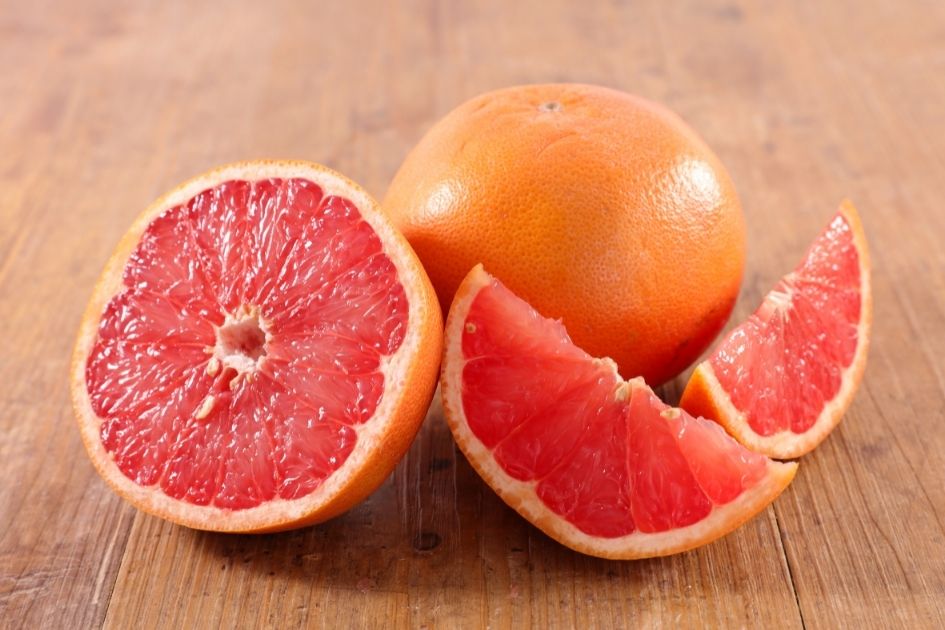Grapefruit is a close relative to both oranges and grapes, and if you’re a lover of citrus fruits, you may find grapefruits delightful—though they have a sour variation.
The vitamins and antioxidants in grapefruits do tons of good for people, including strengthening the heart and working on the skin.
Having said that, a common mistake people make is to assume a healthy human meal will be advantageous to dogs.
While it is true for some fruits, vegetables, and food, it isn’t the case for every human food. Some are unhealthy, and others could be deadly.
Even more, fruits are deemed unnecessary for dogs by experts and should be reserved for the occasional treat.
Thus, you should ask a valuable question before introducing grapefruit to a dog: Can dogs eat grapefruit, is it safe for them, or should I take steps to prevent my pooch from eating grapefruit?
The answer to this will be developed in detail as we move on, but for now, we would say you should be cautious about grapefruits or any food with ‘grape’ attached to the name.
There are too many risks a dog faces if he consumes grapefruit, especially regularly.
For starters, the dog may not even appreciate the sour taste of some grapefruits. Even the sweet ones have many downsides.
Read on to know more about what this healthy fruit can do to a dog.
Is Grapefruit Safe for Dogs?
Like we mentioned earlier, there are many factors to consider before feeding grapefruits to your dog.
The peel of the grapefruit plant itself is considered a danger for canines, and you should not let your dog eat a grapefruit peel (you may not struggle to keep them away, many dogs won’t like the taste.)
The grapefruit flesh is considered safer, but too much of it can lead to skin irritation and stomach upset that would leave your dog in pain.
To be clear, the nutrients in grapefruit aren’t what makes it toxic. The nutritional value of grapefruits shows that the fruit even has some benefits to dogs.
Let us highlight some of the major nutrients a 100-gram grapefruit contains:
- Calories: 42
- Fat: 0.1g
- Potassium: 135mg
- Carbohydrates: 11g
- Protein: 0.8g
- Vitamin C: 52%
Though the low level of protein cancels it from being the main diet, grapefruits have low calories, a lot of vitamins, and potassium.
It should be able to act as a supplement to dogs. However, the acidic content in grapefruit is the mud on an otherwise white wall.
The citric acid in a dog can cause harm to a dog’s digestive system, making him sick. In dire cases, your dog may lose his life.
Can Dogs Eat Grapefruit?

Grapefruit isn’t candy or chocolate, so your dog may not feel tempted to eat it. The sour taste and tangy flavor are a turn-off for canines who’d prefer something sweet with less sting.
Dogs are curious creatures, though, and may take an impulsive bite of a grapefruit. Many dogs don’t show restraint, and hunger may trump the initial dislike he has of grapefruits.
This becomes a problem if the dog accidentally consumes too many grapefruits.
A little grapefruit isn’t also fatal to dogs, so some dog owners do let their pets have a little.
However, while grapefruits aren’t entirely useless, the risks shroud the advantages.
Is Grapefruit Bad For Dogs?
We have established that grapefruits are not inherently poisonous, but you can do better when looking for a healthy supplementary diet for your dog.
To ascertain how bad grapefruits are for dogs, let’s weigh the advantages and disadvantages.
Advantages of Grapefruits
- Grapefruits are low in calories: People who want to lose pounds take grapefruits and some other citruses, like orange. This helps them get rid of the unwanted flesh.
Obese dogs can also get back their ideal shape with grapefruits and other low calories treat.
Related: Can Dogs Eat Limes?
- They contain no cholesterol: High cholesterol in both dogs and humans blocks the normal flow of blood and weakens the heart. Cholesterol is absent in grapefruits, making them a healthy snack.
- They prevent dehydration: The moisture in grapefruits eases thirst, especially in the absence of sufficient water. The moisture replenishes both the bodies of humans and their furry friends.
- Grapefruits supply vitamins and antioxidants: Dogs don’t need external sources of vitamins, but the extra amount does help in the smooth functioning of the organs and a dog’s overall well-being.
The antioxidants prevent inflammation and the destruction of cells.
Disadvantages of Grapefruits
- The acidic content in grapefruits is toxic to dogs and troubling. It can cause your dog to vomit, be in pain, or be hospitalized for intensive treatment.
- Dogs don’t fancy the taste of grapefruits, unlike other fruits like bananas and oranges. This gives more incentive to not feed your dog with grapefruits.
- The toxicity of grapefruits spread to every part, including the seeds and peel. The flesh can be eaten by dogs, but even that can irritate their stomach.
- Grapefruit poisoning can happen, and it is a serious case. Symptoms include depression, vomiting, diarrhea, and photosensitivity.
Other healthy fruits can provide the nutrients grapefruits give dogs without the drawbacks.
We’ll look at these alternatives later, but let’s consider what will happen to your dog if he accidentally consumes grapefruit.
What Will Happen if My Dog Eats Grapefruit?

The possible effect of grapefruit on a dog depends on how many he eats and his size. A toy breed may not experience the same challenges as a large dog.
Also, the part eaten matters too. If your dog eats the peel or seed, he’ll be in more trouble than if he eats the flesh.
The minimal problems a dog could face after eating grapefruits may not be so serious as to get him to the veterinarian, and it should subside after a while.
However, if the symptoms persist, get him to the veterinarian.
A major consequence of grapefruits to a dog is grapefruit poisoning. This is caused by essential oils and psoralens, both of which are toxic to dogs.
We’ve mentioned the symptoms of grapefruit poisoning, and it will keep progressing till you get your dog treated.
What Should I do if my Dog Accidentally Eats Grapefruit?
This is more uncommon than the chances of a dog eating something sweeter, like ice cream or fried chicken. However, it does happen, sometimes to the point of concern.
You can prevent this by making sure your basket of fruits is kept at a place a dog can’t reach.
Indoor dogs should also have boundaries, and you should teach them some commands to keep them from entering ‘forbidden’ areas, like your bedroom and the kitchen.
However, if your dog eats grapefruit, the first thing to do is to take away any remaining one. This should be done without hesitation, but do not panic as that would work against you.
You need to stay calm for your dog to remain calm, too, especially if he’s of a sensitive breed.
Next, determine how much he ate and when he ate it. Also, know if he bit off only the flesh, or if he swallowed some peels and seed.
Symptoms may take 30 minutes or an hour to manifest, but you don’t have to wait that long if you feel there’s an emergency.
Early diagnosis may save your dog’s life if he comes down with grapefruit poisoning.
During the diagnosis, the veterinarian will ask you some questions to determine the next step to take. She may also perform some tests on the ailing dog.
After that, she’ll know how best to treat your pet pooch. It may involve induced vomiting, IV fluid, antiemetic, activated charcoal, etc.
Alternatives to Grapefruits
We’ve seen numerous reasons for you to cancel out grapefruit from your dog’s feeding plan and how other fruits can supply the benefits of grapefruits without putting your dog’s health on the line.
Of course, you should visit a veterinarian to know the right way to serve these fruits to your dog, but they are more preferable to grapefruits.
Some of these fruits dogs can eat are:
- Strawberry and Blueberry
- Peaches
- Mangoes
- Apples
- Bananas
- Watermelon
- Oranges
What if your dog rejects the fruit you offer? Please don’t force it. They can do without fruits.
As long as their main dog food diet comes at the right time and in the right amount, they will be fine.
Any new fruit should be served in small amounts for the first time, and use your dog’s reaction to determine whether you should continue or not.
Related: Can Dogs Eat Limes?
FAQs
Will grapefruit hurt my dog?
Grapefruits will not instantly make your dog drop dead, but it isn’t safe for dogs. The peels and seeds are dangerous, even in small amounts. Even the flesh they’d considered safer can make your dog suffer from an upset stomach.
Are citrus fruits good for dogs?
Some citrus fruits are edible, and you can feed your dog the flesh without many problems. Nevertheless, dogs are not fans of citrus fruits due to their lemony taste and their acidic property.
Is there any fruit that’s bad for dogs?
Some fruits are toxic to dogs and should be avoided if you don’t want to put a dog through medical complications. Some examples are avocadoes and cherries. Grapes are also not recommended for dogs.
Are grapefruits toxic?
The flesh and juice of grapefruits are not toxic to humans and dogs, but too much of it will affect a dog. It would be best if you kept the peel and seed far from the reach of dogs as those are toxic.
The Bottom Line: Can Dogs Have Grapefruit?
If you’re considering trying some fruits to spice up your dog’s diet and give him a taste of something different, don’t add grapefruits to your list.
It may be a fruit you enjoy, but Jack may not appreciate it as much as you do. With dogs, caution must be applied when feeding human food.
It is best not to feed them grapefruits, even a little.
You May Also Like: Can Dogs Eat Guava?
Resources:
- Which Fruits Can Dogs Eat? – PetMD







